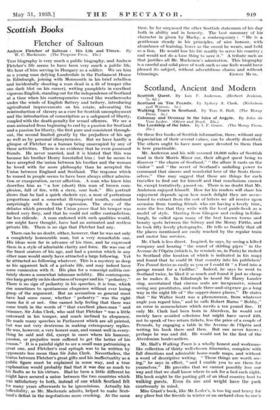Scottish Books
Fletcher of Saltoun
Andrew Fletcher of Saltoun : His Life and Times. By W. C. Mackenzie. (The Porpoise Press. 15s.) This biography is very much a public biography, and Andrew Fletcher's life seems to have been very much a. public life. We hear of him serving in Hungary as a soldier. We see him 4s a young man defying Lauderdale in the Parliament House in Edinburgh, joining with Monmouth in his brief rebellion and incidentally shooting a man dead in a fit of temper (the one dark blot on his career), writing pamphlets in excellent vigorous English, standing out for the independence of Scotland at a time when his contemporaries veered like weathercocks under the winds of English flattery and bribery, introducing agricultural improvements on his estate, advocating the reintroduction of slavery as a cure for Scottish unemployment and the introduction of conscription as a safeguard of liberty, coupled with the death penalty for sexual offences. We see a man animated from beginning to end by a passion for Scotland and a passion for liberty, the first pure and consistent through- out, the second limited greatly by the prejudices of his age as well as by personal idiosyncrasies. But we have hardly a glimpse of. Fletcher as a human being unoccupied by any of these activities. There is no evidence that he even possessed friends. He never married,' and it is hinted that this was because his brother Henry forestalled him ; but he seems to have accepted-the union between his brother and the woman he loved with far more philosophy than he accepted the Union between England and Scotland. The response which he roused in people seems to have been always either admira- tion or exasperation, never Affection. A man who knew him describes him as " a low (short) thin man of brown com- plexion, full of fire, with a stern, sour look." His portrait shows that he had a quick choleric eye, a nose of portentous proportions and a somewhat ill-tempered mouth, combined surprisingly with a frank expression. The story . of the debates which preceded the Union prove that his temper was indeed very fiery, and that he could not suffer contradiction, far less ridicule. A man endowed with such qualities would, one might have thought, have had an animated and restless private life. There is no sign that Fletcher had any.
There can be no doubt, either, however, that he was not only a completely honourable man, but a very remarkable one.• His ideas were far in advance of his time, and he expressed them in a style of admirable clarity and force. He was one of the finest orators of his age, and had a passion which in any other man would surely have attracted a large following. Yet he attracted no following whatever. This is a mystery as deep as his apparent lack of a private life, and may indeed have some connexion with it. His plan for a conscript militia cer- tainly shows a somewhat inhuman nobility. His contempora- ries harp greatly on his shortness of temper and his " pedantry.", There is no sign of pedantry in his speeches, it is true, which rise sometimes to spontaneous eloquence without ever losing< grasp of the -argument. But an accusation so general must have had some cause, whether " pedantry " was the right. name for it or not.. One cannot help feeling that there was some truth in the words of " that excellent place-man " and trimmer, Sir John Clerk, who said that Fletcher " was a little untoward in his temper, and much inclined to eloquence. He made many speeches in Parliament which are all printed, but was not very dexterous in making extemporary replies. He was, however, a very honest man, and meant well in every- thing he said and did, except in cases where his humour, passion, or prejudice were suffered to get the better of his reason." It is a painful sight to see a small man patronizing a great one, and Fletcher's real epitaph was to be written by opponents less mean than Sir John Clerk. Nevertheless, the hiatus between Fletcher's great gifts and his ineffectuality as a public figure must be explained in some way, and a true explanation would probably find that it was due as much to his faults as to his virtues. Had he been a little different he might have secured a union between the two countries which was satisfactory to both, instead of one which Scotland felt for many years after‘Vards to be ignominious. Actually his inflexibility, as Mr. Mackenzie admits, helped to make Scot- land's.defent in the negotiations more crushing. At the same time, he far surpassed the other Scottish statesmen. of his day both in ability and in honesty. The best summary of his character in given by Macky, a contemporary : " He is a gentleman steady in his prinCiples, of nice honour, with abundance of learning, brave as the sword he wears, and bold as a lion. He would lose his life readily to serve his country; and would not do a base thing to save it." A tribute such as that justifies all Mr. Mackenzie's admiration. This biography is a careful and solid piece of work such as one feels would have pleased its subject, without adventitious charm and without


























































 Previous page
Previous page